Improvisation and Playing by Ear
Free your creativity

Classically-taught, but no idea what to do if the notes aren't written out? Many people learn piano for years and without being taught how to improvise or play by ear. And these are the skills that enable you to just sit down and play for fun. There is so much fun to be had with the flexibiltiy and creativity of these skills!
“I think creativity is important, and self-expression. Music is a language. You don’t learn to speak by learning poems off by heart”
- a comment from a survey of piano teachers about improvisation
Anyone can learn!
Playing from chord symbols and 'fake books'
Learn what those chord symbols mean – G7, Dsus4, C6 and so on – how to interpret them and how to play them. Using the melody and chord symbols you can learn how to make your own arrangements of songs, and how to elaborate or simplify other arrangements. You can also use this method to write or transcribe your own songs.
Playing by ear
You can learn how to work out the melody of a song by ear, then work out the chords, then use these to come up with your own arrangements of songs, all entirely by ear. It’s a great way to explore the theory of music, too, as you discover how the music works.
Jazz improvisation
Jazz musicians call it ‘soloing’ – playing a solo over a given set of chords. It is easier to learn than you might think, and can be learned in a step-by-step way. You can also learn about all those rich jazz harmonies – how they work, and how to achieve them.
Casual or regular lessons
You can start with just a one-hour lesson, at a casual rate, or book weekly lessons to help you. You may find you already know more than you think!
Find out more
Contact Susan to learn more about improvisation and playing by ear.
About Susan Deas
Susan Deas is a professional musician, lecturer and teacher. She has been teaching piano for over twenty years, and her students learn both classical and contemporary styles, including playing by ear and improvisation. Susan also gives professional development workshops and lessons to private music teachers. She performs professionally as a pianist and organist, and lectures in music theory and music appreciation for Sydney University’s Centre for Continuing Education. Susan’s training includes a Bachelor of Music with a major in Performance (Piano) and Musicology, a Master of Music Studies (Studio Pedagogy), a Bachelor of Arts (Communications), and an A.Mus.A in Musicianship. Susan is an Accredited Member of the Music Teachers’ Association of NSW.
More about Susan's qualifications
Subscribe to Susan's mailing list to hear about future events for music students


